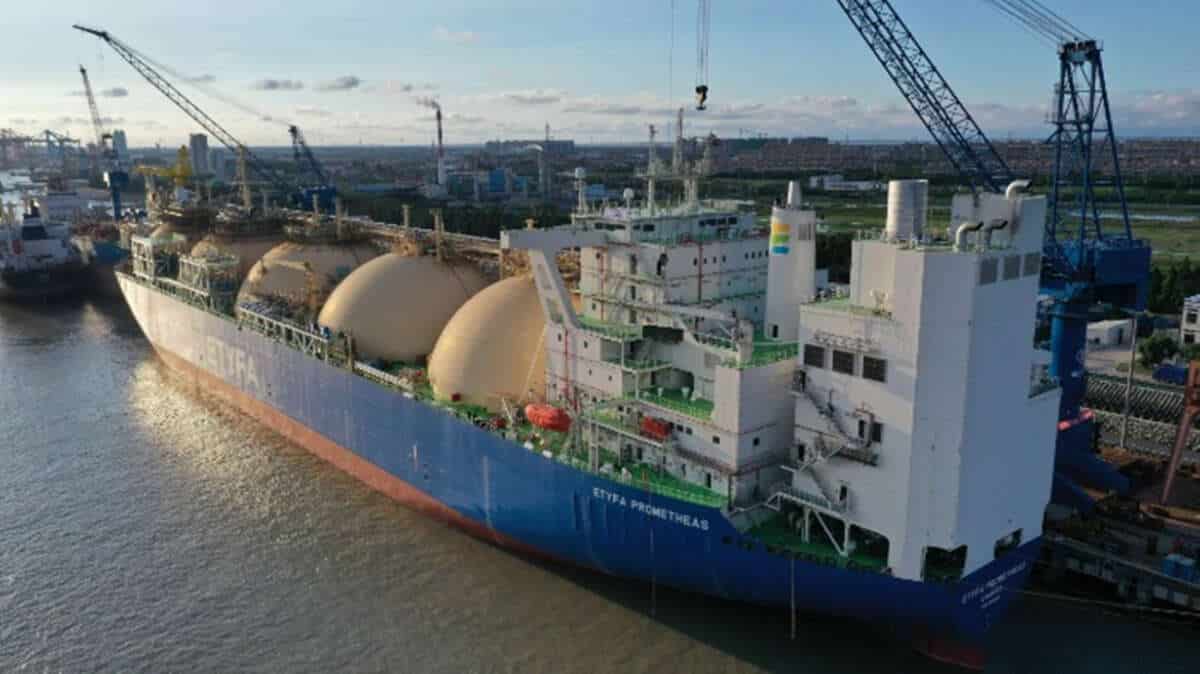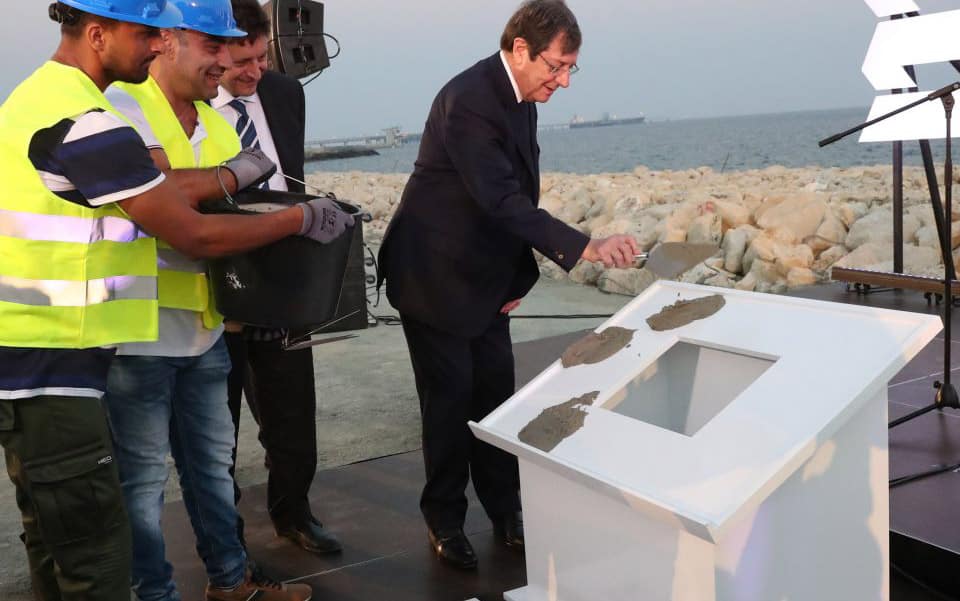Terminal at Vasiliko started under a cloud of suspicion and has just got worse
The writing was on the wall even before the contract for the liquified national gas (LNG) terminal in Vasiliko was signed with the China Petroleum Pipeline Engineering Company (CPP) in December 2019. It has now gone disastrously wrong at a potentially huge cost to the taxpayer.
It started with a very suspicious tenders’ procedure in which two of the three consortiums bidding for the project had been excluded for compliance reasons, before any technical and financial assessment of their offers had even been carried out.
There was only one offer on the table for a project, described by then president, Nicos Anastasiades, as one of the biggest infrastructure projects in the history of the Republic, that was estimated to cost half a billion euros. An amount of €289 million would go on the construction of the LNG terminal in Vasiliko and the FSRU (Floating, Storage, Regasification Unit) – the ship part of the project – while €210m would be paid for their operation and maintenance over a 20-year period.
The total cost has already climbed far higher, the latest estimate by the audit office putting it at €542m. CPP was paid an extra €25m for increased cost of materials while the engineers also received additional payments. It could climb much, much higher if a statement of claim –submitted to the court of arbitration in London at the end of 2022 by CPP – demanding an additional €200m in costs is successful.
Written warning
It could take two years before the court issues a decision, but the company stopped work at the Vasiliko terminal 10 days ago. Speaking to the Cyprus Mail earlier this week, Energy Minister Giorgos Papanastasiou warned “we will give them another week and then issue a written warning.”
According to the minister, the FSRU is 95 per cent ready, although it still needs to secure certification to sail to Cyprus. The terminal in Vasiliko, which has been beset by problems and includes disputes between CPP and its sub-contractors, is only 45 to 50 per cent ready, said Papanastasiou.
When the contract was signed the completion date was September 2022, but three new dates have been given since then, the latest being July 2024. If it has taken almost three years for half the work at the terminal to be completed, it is unlikely the remaining 50 per cent will be finished in six months, especially now the company has stopped work.
In an article in the Sunday Mail two years ago in January 2022, energy analyst Dr Charles Ellinas wrote: “Based on informal, unofficial information, the project is unlikely to be completed before the end of 2024. CPP’s lack of experience in such projects appears to be a contributing factor.”
It appears that not only did the government manage to end up with only one offer for the LNG terminal in 2019, but it was also submitted by a consortium that had no experience in such projects.
In a document prepared by the European Investment Bank’s (EIB) internal services – excerpts of which were published by French newspaper Liberation – before the bank’s board was to validate the granting of a €150m loan in June 2020, the obvious question was asked. As there was only one offer on the table, didn’t common sense dictate the cancellation of the call for tenders and the relaunch of another one for such a big project?
Before the signing of the contract, auditor-general Odysseas Michaelides had sent a 10-page letter to the Public Company for Natural Gas (Defa) saying there had been blatant irregularities in the evaluation of the tenders which necessitated the cancellation of the procedure.
After an exchange of letters, between Defa and Michaelides, with the latter insisting on the cancellation, Anastasiades stepped in and called a meeting at the presidential palace in late November 2019, attended by Michaelides, the attorney general, the accountant general and the ministers of energy and finance.
Political decision
It was reported that after listening to everyone, Anastasiades took the “political decision” to go ahead regardless of the irregular tenders’ procedure.
He decided that “the construction of infrastructure for the importation of natural gas is a project of great national importance and should proceed regardless of the mistakes, omissions and irregularities, identified by the auditor-general in the process of the evaluation of the tenders by Defa,” Politis reported on November 23, 2019. He urged Defa to sign the contract with CPP.
Since 2005, there had been 10 attempts by the state to import natural gas, including compressed natural gas (CNG), and none of them materialised for a variety of reasons. Anastasiades was determined to go ahead and give the project to CPP, ignoring all the warning signs.
Speaking to the Cyprus Mail on Wednesday, Papanastasiou did not pull his punches.
“I had concerns since day one,” he said. “We are paying for sins of the past.”
The report prepared by the EIB internal service, six months after the signing of the contract and reported in Liberation in June 2020, raised questions about the financials and the legitimacy of the deal, which excluded two other consortiums – one led by South Korean conglomerate Samsung and the other by Greek company Damco Energy – for compliance reasons and chose the consortium with no expertise or know-how in LNG terminals.
This biggest concern was the cost of the Vasiliko LNG terminal. “The price of the project puts it in the high end for such a scheme,” said the EIB report. The strange thing, the report said, was that it was not high end technically because it was a conversion project. The cost of this operation – the LNG tanker and its conversion to FSRU – was estimated to cost €200m, two thirds of the total amount of the project. A 2002 boat – the Etyfa Prometheas – belonging to Shell was bought and taken to a Shanghai shipyard, where it still sits, currently awaiting certification.
“Prices above the market,” said the EIB report. Liberation reported that a year earlier a similar conversion contract was signed by Croatia for less than €30m and that “LNG carriers from the early 2000s are normally traded for €30m to €40m.” The discrepancy from the normal price is “therefore more than €100m, or more or less, the subsidy from the European Union.”
‘Ethical scandal’
The European Commission had said it would give a €101m grant in the framework of the ‘Connecting Europe Facility’, but this was conditional on the EIB board approving a €150m loan for the project. The Anastasiades government put big pressure on the EIB to approve the loan, so that the commission would also release the €101m.
“Many in the industry were surprised when we found out the name of the supplier selected by Cyprus,” a prominent LNG player was quoted as saying by Liberation. “It is very difficult to understand how they came to this conclusion; the solution is expensive.”
A European source quoted by the paper, said: “This contract is grotesque. It is a financial and ethical scandal.”
The irony was at the time of the tenders, Norwegian company Hoegh, which specialised in LNG, had offered to supply Cyprus with one of its FSRUs for a rental agreement.
“We can put it into service in six months and the total cost of the project does not exceed €35m per year, but would allow the Cypriot government to save €100m according to our calculations,” the CEO of Hoegh, Sveinung Stohle, told Liberation.
It was a much more flexible, faster and cheaper solution. There was no need for a 20-year contract like the one signed with CPP and Hoegh did not require the construction of a new pier at Vasiliko. The only problem was that rental agreements were not eligible for EU grants.
But the CPP contract may end up costing the taxpayer a lot more than a rental agreement, if the auditor-general’s recent report is anything to go by.
Dr Ellinas had warned as far back as 2019 that “Cyprus runs the risk of being trapped in an expensive undertaking for at least the next 10 years. This might not boost industry but may also become a long-term burden to Cyprus’ economy.”
At the end of 2019, Defa had boasted that the import of LNG would bring electricity prices down by 25 per cent. Four years later, no LNG has been imported, and it is not known when it will arrive – CPP’s latest date of July 2024 seem overly optimistic under the circumstance – and electricity bills are still burdened with €300m annual emission fines.
Nobody knows what the final bill for the LNG Vasiliko terminal will be if it does not degenerate into a never-ending legal dispute and is eventually completed. What is known is that former president Anastasiades personally decided that a €500m infrastructure project, Cyprus’ biggest ever, should be awarded without competitive tenders to a company with no experience of such a project.








Click here to change your cookie preferences